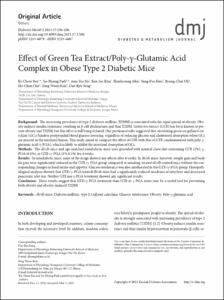Effect of Green Tea Extract/Poly-γ-Glutamic Acid Complex in Obese Type 2 Diabetic Mice
- Keimyung Author(s)
- Park, Jae Hyung; Song, Dae Kyu; Bae, Ki Cheor; Cho, Ho Chan; Kim, Sang Pyo
- Department
- Dept. of Physiology (생리학)
Dept. of Orthopedic Surgery (정형외과학)
Dept. of Internal Medicine (내과학)
Dept. of Pathology (병리학)
- Journal Title
- Diabetes & Metabolism Journal
- Issued Date
- 2013
- Volume
- 37
- Issue
- 3
- Abstract
- Background: The increasing prevalence of type 2 diabetes mellitus (T2DM) is associated with the rapid spread of obesity. Obesity
induces insulin resistance, resulting in β-cell dysfunction and thus T2DM. Green tea extract (GTE) has been known to prevent
obesity and T2DM, but this effect is still being debated. Our previous results suggested that circulating green tea gallated catechins
(GCs) hinders postprandial blood glucose lowering, regardless of reducing glucose and cholesterol absorption when GCs
are present in the intestinal lumen. This study aimed to compare the effect of GTE with that of GTE coadministered with poly-γ-
glutamic acid (γ-PGA), which is likely to inhibit the intestinal absorption of GCs.
Methods: The db/db mice and age-matched nondiabetic mice were provided with normal chow diet containing GTE (1%), γ-
PGA (0.1%), or GTE+γ-PGA (1%:0.1%) for 4 weeks.
Results: In nondiabetic mice, none of the drugs showed any effects after 4 weeks. In db/db mice, however, weight gain and body
fat gain were significantly reduced in the GTE+γ-PGA group compared to nondrug-treated db/db control mice without the corresponding
changes in food intake and appetite. Glucose intolerance was also ameliorated in the GTE+γ-PGA group. Histopathological
analyses showed that GTE+γ-PGA-treated db/db mice had a significantly reduced incidence of fatty liver and decreased
pancreatic islet size. Neither GTE nor γ-PGA treatment showed any significant results.
Conclusion: These results suggest that GTE+γ-PGA treatment than GTE or γ-PGA alone may be a useful tool for preventing
both obesity and obesity-induced T2DM.
Keywords: db/db mice; Diabetes mellitus, type 2; Gallated catechins; Glucose intolerance; Obesity; Poly-γ-glutamic acid
- Publisher
- School of Medicine
- Citation
- Ki-Cheor Bae et al. (2013). Effect of Green Tea Extract/Poly-γ-Glutamic Acid
Complex in Obese Type 2 Diabetic Mice. Diabetes & Metabolism Journal, 37(3), 196–206. doi: 10.4093/dmj.2013.37.3.196
- Type
- Article
- ISSN
- 2233-6079
- 파일 목록
-
-
Download
 oak-aaa-01603.pdf
기타 데이터 / 2.9 MB / Adobe PDF
oak-aaa-01603.pdf
기타 데이터 / 2.9 MB / Adobe PDF
-
Items in Repository are protected by copyright, with all rights reserved, unless otherwise indicated.